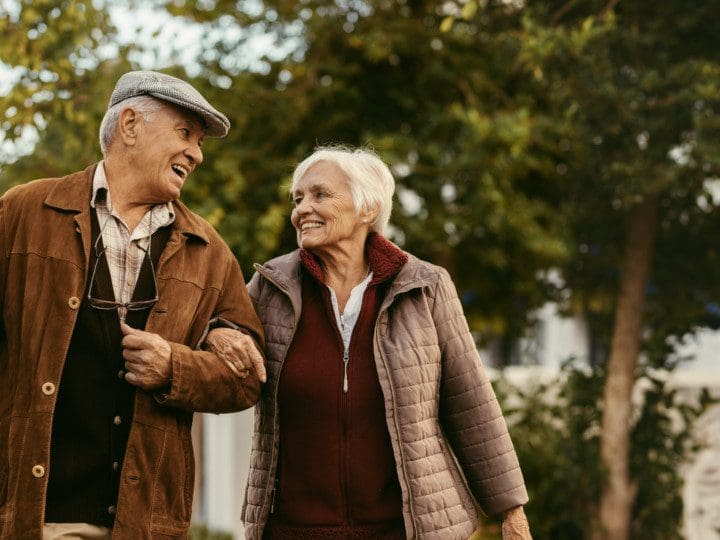While some people enjoy the crisp weather and cosy nights winter brings with it, as we get older, keeping well throughout the colder months can bring its own set of challenges.
Not only can the winter exacerbate health conditions associated with age, but the shorter days and longer nights can bring with them isolation and loneliness.
However, you can do plenty of things to keep your body and mind healthy and happy, even when the temperatures outside are plummeting. Read on to discover everything you need to know about winter wellness for older adults and embrace the cold season with open arms.
Why Winter Wellness for Older Adults is Crucial
Cold temperatures, reduced visibility, dark days, slippery surfaces, and potential electricity outages can pose even more risk as we age.
In the winter, cold weather and spending more time inside can mean illnesses spread more easily and, as we age, our immune systems find it harder to fight off viruses and bugs. Colder weather also weakens the immune system, which can increase the risk of catching bad colds and flu. Wintery weather is also attributed to more serious health conditions such as breathing issues, hypothermia, pneumonia, and cardiovascular conditions.
It’s not just physical challenges older adults face during the winter, but mental ones too. It’s just as important to look after your mind as it is your body. Seasonal Affective Disorder (SAD) is an issue that affects around 1 in 15 people, and it has similar characteristics to depression, including a low mood, irritability and a loss of pleasure in the things you usually enjoy..
How to Stay Healthy During the Colder Months
Luckily, there are many things you can do to help prevent potential risks that the cold weather brings. Here are some of our favourite winter wellness for older adults tips to incorporate into your life during the colder months.
Get Your Jabs
Getting vaccinated is one of the best things you can do to protect your health from winter illnesses such as colds, flu, and coronavirus. If you are aged 65 or over, you’re entitled to a free flu jab from your GP or pharmacist. There are also vaccinations and boosters to protect you against coronavirus and pneumonia, meningitis, and septicemia. If you haven’t had yours yet, it’s worth speaking to your GP about the different vaccinations you’re entitled to.
Stay Warm
Keeping warm can help your body fight illnesses brought on by the colder months. It’s important to stay warm indoors and outside, so when you’re home, snuggle up with a blanket and hot water bottle, and when you go out, wrap up with a thermal vest, hat, scarf, and gloves.
Personal Hygiene
Make sure you stay on top of personal hygiene by washing your hands regularly and having daily baths or showers. Regular washing can go a long way to stop the spread of germs, so make sure you wash your hands before eating and after you’ve been outside. When popping out, it’s also a good idea to carry some hand sanitiser with you.
Stay Active
Just because it’s cold outside it doesn’t mean you should neglect your physical health. That means keeping active and mobile. Popping out for a daily walk or going to the shops can be more difficult in the winter, but it’s important to stay active so you don’t lose your mobility.
Keeping active generates heat and helps you stay warm, so try and go to your regular exercise classes, wrap up warm and go for a gentle walk, or do some simple chair exercises at home. Exercise, especially in a social setting like a class, is also a mood-booster, which is ideal if you’re feeling a little down due to the cold and dark.
Stay Social
As nice as it is to stay inside and enjoy being cosy while it’s cold outside, staying social can help keep feelings of loneliness at bay. If you regularly attend classes or activities, try to stay on top of them, invite friends and family over for a cup of tea, catch up with people over the phone, or plan a trip to the cinema or theatre with someone you love. It can be easy to let the cold weather force us into hibernation, but keeping in touch with friends and family will stop you from feeling isolated, even when the temperatures plummet.
Top Up Your Vitamin D
Vitamin D contributes to healthy teeth, bones, and muscles. As our bodies create vitamin D from sunlight, it can be hard to get the right amount you need during the winter when sunshine is in short supply. The NHS recommends that adults need 10 micrograms of vitamin D a day, and although you can get some of this from foods such as red meat, eggs, and oily fish, your health might benefit from taking a supplement during the winter.
Prevent Falls
Prevention can be key to keeping you on your feet when the pavements are treacherous due to cold temperatures. Falls among older adults are more prevalent in the winter, thanks to icy pavements. This leads to an alarming number of doctor and hospital admissions. If it becomes icy or snow falls, ask a friend or relative to help you clear your driveway or path, and ensure you wear proper footwear with good traction.
Keeping Well During Winter
While many of the changes during the colder months can be inconvenient for most, they can pose more of a risk to older adults.
Winter brings its own set of challenges for older adults, but with proper precautions, it can be a safe and enjoyable season. By staying active, maintaining a healthy lifestyle, keeping in touch with friends and family, and taking extra care, you can protect yourself from potential risks.
Your wellbeing matters, and with a little extra attention, you can make the most of the winter season.
